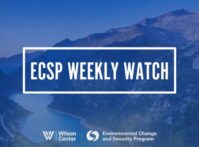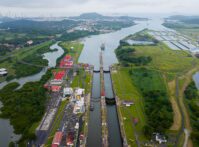-
ECSP Weekly Watch | July 22 – 26
July 26, 2024 By Neeraja Kulkarni
A window into what we are reading at the Wilson Center’s Environmental Change and Security Program
Worsening Health Conditions in War-Torn Gaza (BBC)
Water infrastructure in Gaza was already weak before the beginning of the war in 2023, but intensified conflict and siege of critical infrastructure the damage wreaked by Israel’s military forces on critical infrastructure (including water, energy, and food), has left 70% of the people in Gaza exposed to salinated and contaminated water. Traces of polio have been found in wastewater flowing both between displacement camp tents and in inhabited areas, and experts suggest that this water might be circulating.
The ongoing conflict also has “decimated” Gaza’s health infrastructure, leaving only 16 out of the 36 hospitals to remain only partially functional. There is also a huge shortage of medical supplies. As a result, immunization rates in Gaza have declined drastically. from 99% in 2022 to 89% in 2023. While health workers on the ground provide protection advice to over 2.3 million people in Gaza, the breakdown of infrastructure has made it difficult to implement most of the required measures.
The WHO and UNICEF have prompted that mass polio vaccination drives will be required to avoid the spread of polio and other water-borne diseases. And as water resources between Gaza and Israel are shared, any outbreak can prove harmful to both Palestinian and Israeli infants. The WHO is now has pressing for a ceasefire to prioritize human security and effectively address worsening health conditions.
LISTEN | Environmental Cooperation in the Middle East: A Conversation with Dr. Tareq Abu Hamed
The Climate Paradox of Neglected Petrostates (The Guardian)
Classic “petrostates” such as Russia and Saudi Arabia depend heavily on oil and gas for revenues to balance their national payments. And as high fossil-fuel-dependent nations, they have always been criticized for their role in addressing climate change. Now, researchers have identified over a dozen petrostates that act as climate leaders, but still increasingly invest in fossil fuel developments, referring to this surge as “fundamentally contradictory.”
Fossil fuel exploration activities have rapidly increased since COP29. And despite their climate commitments, petrostates including the US, UK, Norway, Australia, and Canada are responsible for 56% of all new oil and gas licenses since 2000 and 67% of them since 2020. These new reserves are smaller and harder to access, as most large fields have already been explored. They are projected to generate 172m tons of CO2 – equivalent to what would be produced by 43 coal plants.
These countries also have been categorized as “high-capacity low dependency.” This means that while their capacity to produce fuels is high, their economic dependence is low, making them most capable of transitioning to renewable energy sources. Yet their actions tell a different story. Developing countries have historically raised this issue in UN climate events, arguing that while they want to abide by their climate targets, wealthier countries have better circumstances to transition and should be implementation leaders to combat this global crisis.
READ | Fossil Fuel Boom Rewiring North America’s Energy Infrastructure
Nuclear Power is Shaping Australia’s Energy Politics (Reuters)
Climate policy has been a partisan issue in Australian politics. And the country’s right-wing opposition party has thrown a curveball ahead of the elections next year by adding nuclear power to an already tumultuous energy debate. Their nuclear proposal promises to exacerbate already existing partisan debates by placing nuclear and fossil fuels at the forefront of the right-wing agenda, while renewables and storage become the province of left-focused parties.
Australia’s conservative Liberal Party and its junior regional partner, the National Party (a well-established coalition) aim to supplant the current government’s plans to accelerate the construction of renewable energy by urging not only a greater role for fossil fuels, but also the construction of seven state-owned nuclear plants. The ruling Labor Party aimed to increase renewables aims to increase renewables for power generation to 82% (from 40% today) and reduce emissions by 43% compared to 2005 levels.
The new Liberal Party proposal will completely shift the country’s energy debate. Experts believe it will hinder Australia’s energy transition. Their key concerns are a simultaneous move away from renewable sources and a new burden of upfront infrastructure costs. Observers also stress that nuclear energy distribution would be both undependable and insufficient to replace coal plants in the push to meet Australia’s Net Zero targets.
READ | Don’t Panic US: China’s Nuclear Power Ascendancy Has Its Limits
Sources: The Guardian, NPR, Reuters, British Broadcasting Corporation (BBC), The Department of Climate Change, Energy, the Environment and Water (DCCEW), Center for Strategic and International Studies (CSIS), The New York Times
Topics: adolescent health, climate, climate change, conflict, decarbonization, development, electricity, energy, environment, environmental security, Eye On, food security, global health, human rights, humanitarian, Israel, land, meta, Middle East, Middle East at the Crossroads, oil, Palestinian Territories, population, poverty, power grid, sanitation, security, solar, UN, WASH, water, youth
 A Publication of the Stimson Center.
A Publication of the Stimson Center.








